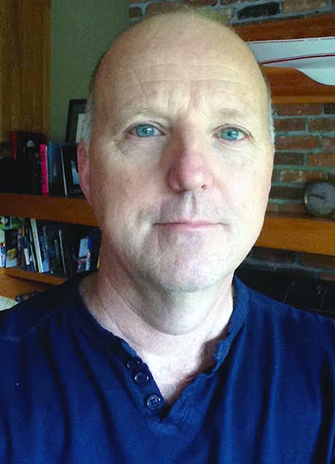
A successful author of books on history, business, and sport has won Canada’s Distinguished Dissertation Award for 2016. “Stone of Power,” Douglas Hunter’s (YorkU, PhD History) study of how North America’s Indigenous people have been portrayed and their cultural history sometimes erased, was the ultimate choice of the judges.
The 57-year-old Hunter has several writing awards to his credit and has an established career as a writer, editor, cartographer and graphic artist. He returned to do his PhD at the urging of a York University historian who would become his thesis supervisor.
“I invited him to lecture about explorers to the New World in one of my classes,” says Carolyn Podruchny, associate professor of history at York University. “At the end of that class I was convinced he should be doing a PhD.”
Podruchny describes him as “brilliant, funny and humble,” adding that “he brings a high standard and seemingly limitless energy and curiosity to his work. His intellectual generosity with his peers was inspiring to our department.”
His work as a journalist and author provided the organizational and research skills to complete an engaging thesis. PhD work enhanced those skills. But it provided much more.
“It was an opportunity to delve into what historians have already written on this topic and push it to a new level,” Hunter says from his home office on Ontario’s Georgian Bay. “It involved more reading and more thinking than I could ever have imagined.”

A skilled storyteller, Hunter used a 40 tonne grey boulder, lodged in a Massachusetts riverbed and covered in petroglyphs, as the grounding for his study. Tracking the theories and explanations around Dighton Rock, which was once the most famous relic in America, is Hunter’s vehicle for an exploration of how Indigenous people have been demeaned by leading thinkers since the late seventeenth century. “Dighton Rock’s origins have been a much contested topic among historians,” he says. “Studying its historiography teaches us a lot about ourselves, colonization and how we do history.” The dissertation shows how theorists were really trying to answer two questions, to the advantage of colonizers: who belonged in America, and to whom to did America belong?

Hunter almost threw in the towel five weeks into the process of pursuing a PhD. He was used to a heavy workload, but he hadn’t anticipated the reading volume of the course work. And he worried about the 30-year gap since he’d last been at university. The road to Toronto from Georgian Bay was a challenge during winter months, and family responsibilities, which include being a primary caregiver to his special needs adult son, weighed heavily upon him. But he stuck with it, earning a Vanier Canada graduate scholarship as well as Canada’s William E. Taylor fellowship as the outstanding doctoral candidate in the social sciences and humanities. He is currently a postdoctoral fellow under Dr. Susan Roy at the University of Waterloo. An updated version of the dissertation, incorporating additional research, will be published as Stone of Power by University of North Carolina Press in fall 2017. He is also writing a book for McGill-Queen’s University Press on the Beardmore Viking relics hoax at the Royal Ontario Museum.
“Douglas Hunter is an outstanding choice for the Distinguished Dissertation Award, “says CAGS President Brenda Brouwer. “He shows how life and experiences outside the academy can influence and inspire the pursuit of a scholarly endeavour. A PhD affords a student the opportunity to delve into a topic that excites them and explore it in all its dimensions. Canadian academia is richer for having Douglas Hunter bring his special brand of curiosity and creative thinking to the field indigenous history.”
To read the thesis, go to: http://yorkspace.library.yorku.ca/xmlui/handle/10315/30045.
Hunter will receive his award Nov. 3, at the CAGS National Conference in Toronto.


